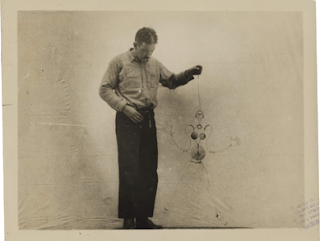Thursday, April 29, 2010
Wednesday, April 28, 2010
1952
- Desiderata
- Go placidly amid the noise and haste, and remember what peace there may be in silence.
- As far as possible without surrender be on good terms with all persons.
- Speak your truth quietly and clearly; and listen to others, even the dull and the ignorant; they too have their story. Avoid loud and aggressive persons, they are vexations to the spirit.
- If you compare yourself with others, you may become vain and bitter; for always there will be greater and lesser persons than yourself.
- Enjoy your achievements as well as your plans. Keep interested in your own career, however humble; it is a real possession in the changing fortunes of time. Exercise caution in your business affairs; for the world is full of trickery.
- But let this not blind you to what virtue there is; many persons strive for high ideals; and everywhere life is full of heroism.
- Be yourself. Especially, do not feign affection. Neither be cynical about love; for in the face of all aridity and disenchantment it is as perennial as the grass.
- Take kindly the counsel of the years, gracefully surrendering the things of youth.
- Nurture strength of spirit to shield you in sudden misfortune. But do not distress yourself with dark imaginings. Many fears are born of fatigue and loneliness.
- Beyond a wholesome discipline, be gentle with yourself. You are a child of the universe, no less than the trees and the stars; you have a right to be here. And whether or not it is clear to you, no doubt the universe is unfolding as it should.
- Therefore be at peace with God, whatever you conceive Him to be, and whatever your labors and aspirations, in the noisy confusion of life keep peace with your soul.
- With all its sham, drudgery, and broken dreams, it is still a beautiful world.
- Be cheerful.
- Strive to be happy.
- Max Ehrmann, Desiderata, Copyright 1952
- .
Cigarette
The first fifteen minutes of my drive to campus wind past a field
which is topped, for a second, by a glimpse of Budd Inlet and Cooper
point beyond, there is a horse lying down, a sign in front of a
Lutheran church that says "Anger's best solution is delay", there are
some goats that I noticed for the first time a couple days ago, there
are two parks, a lonely Shell station with a convenience store that is
stocked more like a general store, with bacon, nails, coffee beans,
cans of soup, video rentals, copies of a locally authored book about
geoducks. I often have my first cigarette of the day on this
drive—the nicotine creeps into the back of my neck, my stomach, my
nervous system, my brain. Nicotine initially causes a rapid release
of adrenaline, the "fight-or-flight" hormone. It also causes
increased release of acetylcholine from my neurons, leading to
heightened activity in cholinergic pathways throughout my brain. This
in turn promotes the release of the neurotransmitter dopamine in my
brain's reward pathways. The nicotine also causes the release of
glutamate, a neurotransmitter involved in learning and memory. My
first cigarette stimulates receptors in my hypothalamus, hippocampus,
thalamus, midbrain, and brain stem, as well as my cerebral cortex.
Besides acetylcholine and dopamine, norepinephrine, serotonin,
vasopressin, growth hormone, and ACTH neurotransmitters are released
by the nicotine's actions. Many smokers enjoy their initial cigarette
more than any other, but I consistently feel sick after the second
puff. My nausea is always accompanied immediately by an emotion like
depression, but it comes on with more urgency, with the sharp edges of terror.
Whatever tide of neurotransmitters and hormones washes through my
system, it pushes me up against a familiar, yet mysterious shore. It
is a low-lying place where I've lost shoes in the sucking mud. I
stuck my kindergarten teddy bear under a bush there. I had
accidentally carried it halfway to my first grade classroom, suddenly
seized by the fact that I was way too old to have a teddy bear at
school. When I returned the stuffed animal was gone. When I visit
this foggy place, I am still the shortest in my class. In the murky
air, I pass an anguished earlier self and know I can't help. I can't
stop him from asking that girl to marry him, from throwing dozens of
pages of horrible poetry at her feet and crying on no sleep. "You
don't really love her," I might yell at my earlier self, "You are on
amphetamines, or in withdrawal from all that Codeine and Vicodin. You
are just desperate for some meaning." I can't make him hear, no
matter how urgently I whisper, "You are embarrassing yourself!"
When this sharp edge of self-pity, this familiar amorphous violence,
hits me after the second drag of my first cigarette, when I am
suddenly balanced precariously on this side of tears, it takes me a
moment to realize that this happens every time. Every morning I smoke
a cigarette. Every morning I am momentarily washed away, spun around,
sucked up. Every morning this bad tide quickly recedes and I forget
that I was drowning a second ago. The day comes crowding in, happily,
and the moment is forgotten. Today I know the terror passes, but I didn't always.
I haven't always been able to visit the darkest spot on that gloomy
shore. At one time, those desperate memories were inaccessible, even
though they were fresh. From the flat uncomfortable place that the
people in the recovery business call "post acute withdrawal syndrome,"
I couldn't quite believe that my paranoia had been so imaginative,
that terror was a thing I had actually felt, sharply and recently.
There are thoughts I had in the days before I went into rehab that I
still don't want to write down, thoughts that I would imagine a
schizophrenic might have: parasites, poisoned water, someone hiding in
my house…everyone knows, they all know…One night I collapsed face down
on my couch, every light in my house burning, my mind was still racing
but I hadn't eaten or slept in days, so my body collapsed. As clear
as if it was in the other room, a voice called my name, a voice I was
sure belonged to someone playing a trick on me, maybe the neighbor
across the street was hiding in the basement. I am sure, now, that I
hallucinated this voice, but I was as sure, then, that the voice was
real when I answered it: "What? Leave me alone." All this was
insane, but what strikes me as more insane, more pitiful, is the fact
that I did not get up, I just remained face down on the couch,
allowing the conspiracy of killers in my basement free reign.
In the rooms of NA and AA—that is what they are called, "the
rooms"—you hear a lot of things over and over; the experience of the
addict is universal and clichés proliferate. One day at a time.
You're right where you're supposed to be. My best thinking got me
here. Let go and let God. Most recovering addicts insist that they
never want to forget what brought them to the rooms, their "bottom,"
their last high. This is the redemption that my first cigarette of
the day brings me: the reminder of how bad it got.
Addicts don't know much about what feelings are. They have suppressed
them for a long time, pressed them into the feeling of being high and
the feeling of not being high. So, when Bernard, the drug counselor
at my outpatient facility, a big black man who had a weird kind of
non-greasy jerry curl haircut and fingernails that had some type of
fungus on them, demanded of me how I felt about an experience, I was
often at a loss. He helped me out by saying, "There ain't but five,"
pointing at piece of oak tag on which someone had written:
F ear
L oneliness
A nger
P ain
P leasure
S adness
There ain't but five. In one way, the reduction of my emotional range
to an acronym has been a good thing. It is a comfort to be able to
grasp my feelings, write them down, safely label them and place them
back on the shelf, certain that they will all make an appearance at
one time or another, that no matter how they mess up my apartment and
demand my attention, they are only here to visit. Nevertheless, my
emotions are calling the shots, even when they linger in the
background. I'm not sure, but I think that all my choices are
dictated, in the end, by my desire to comfortably balance my emotions.
I try to live so that sadness doesn't dig too deep, so that
loneliness doesn't penetrate as sharply, so that pleasure doesn't
leave me washed up, writhing.
But there is more to a thing than its name. I cannot describe all the
things that happen when I am on that morning drive by looking at an
oak tag poster or researching the psychopharmacological effects of
nicotine. That sudden drop, that shaky dark vision that the
cigarette brings on is something more. It serves several functions.
Its transience assures me of its transience. Its darkness shows me
light. It is contrast.
*****
I have a warm apartment, fifteen minutes from anywhere. I am looking
out window at the water and the hazy silhouette of the Olympics. I
have my neighbor's beagle curled up on the couch. Spring is coming
quickly. I will never run out of good books to read. I have a good
stereo and my favorite radio station comes in clear. I am my parent's
prodigal son. I have goals. I am in college. I am incredibly happy
and light. I will float away.
This is why I thank gravity. This is why I do not want to give up my
daily moment of darkness, of heaviness. My moment of nostalgic terror
is a glimpse at what my life is not, what it was, what it could be:
contrast. When I smoke my morning cigarette, it is the beginning of
my prayer of thanks, my ablution. My moment of terror is not just
payment for my blessings, but reassurance that all things pass, and
all things return.
By Matthew Kreiling
http://dreamingright.com/blog/
.
Tuesday, April 27, 2010
Monday, April 19, 2010
Subscribe to:
Posts (Atom)





















































